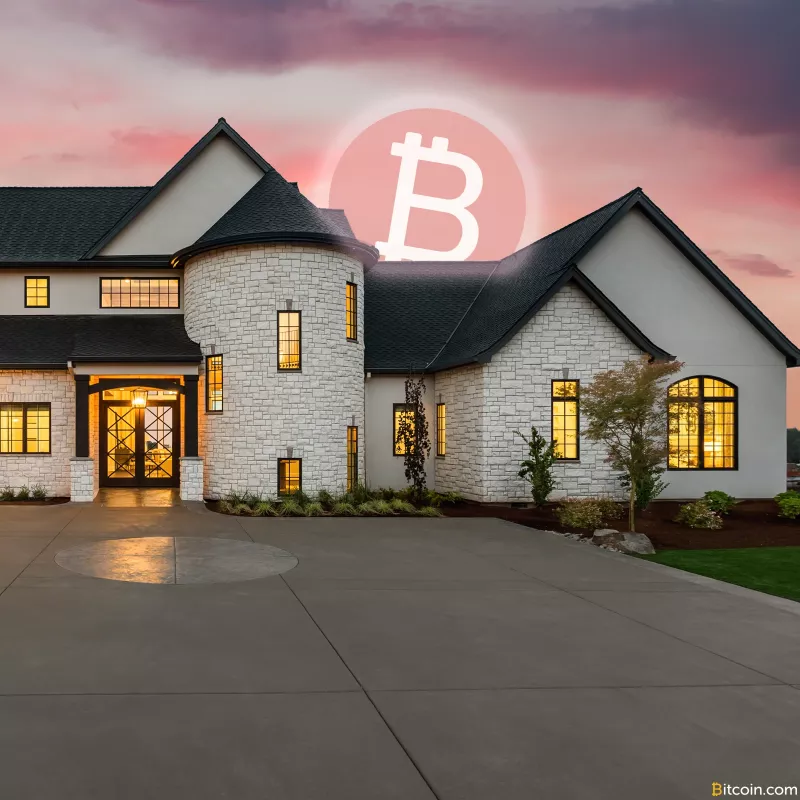The housing market continues to boils even as NFT market cools down. The next step for crypto believers could be real estate. This is about real real estate, not just plots of land in the metaverse. New lending companies are looking for customers who want to pledge their digital currency toward a mortgage. Over a billion dollars of funding has already been poured into startups offering crypto-backed mortgages, including Ledn, which claims to offer “the world’s first bitcoin mortgage”; Figure Technologies, which offers 30 year fixed-rate mortgages using both bitcoin and ether; and Milo, which claims to be “the first US crypto mortgage” provider. Though the industry is growing, it’s not for the average crypto HODLer.
Ledn, Figure, and Milo all allow customers to take out mortgages by putting up cryptocurrency as collateral without cashing it out, unlike a standard mortgage where a new homeowner has the pleasure of handing over their down payment in cash on closing. Crypto mortgage companies let customers hold onto their digital currencies for a couple of reasons: First, crypto believers don’t want to liquidate their portfolio and transfer it back to dollars, just in case the price of crypto continues to rise and they miss post-liquidation gains. Second, converting crypto into cash is a taxable event, according to Steve Carvell, a finance professor and the academic director of Cornell University’s Center for Real Estate and Finance. Leveraging crypto to buy a house avoids such an event. Crypto mortgages, Carvell said, are “really designed for people who bought crypto earlier on and are really wealthy because of it.”
Max Dilendorf, a New York-based lawyer focused on digital assets, echoed Carvell’s assessment. In order for crypto mortgages to be widely adopted, he said, “a lot of users need to have digital assets that have significantly appreciated in value.”
Lenders offer different terms, but with a crypto mortgage, they lock in the crypto for the duration of the loan, as the homeowner makes regular monthly payments—usually in fiat—until the mortgage is paid off. Because a homeowner is holding onto their crypto, if the value of crypto dips by 35%, then the customer is required to pay more cash or put up more crypto collateral in an event called a margin call. In this case, a customer is given 48 hours to shore up their loan. Lenders like Miami-based Milo might liquidate a homeowner’s crypto if they fail to make their mortgage payments or meet their margin call.
Though this threat of margin calls and freefalling crypto values may be anxiety-inducing, Milo CEO Josip Rupena argues that “overall, it’s a safer mortgage transaction” than some traditional mortgages, since homeowners can liquidate their crypto before going into foreclosure. But, as with everything crypto, it’s not quite that simple. Given that all cryptocurrency loans are inherently tied to the value of the cryptocurrency, the risks vary compared to a conventional mortgage, which has a fixed rate. If the price of crypto were to tank, Carvell said, every crypto mortgage would be affected. There would be legal and transactional issues without precedent for how they would be managed. “These companies are unproven to be able to manage that catastrophic risk from their side,” Carvell said. (On May 9, bitcoin was down more than 50% from its all-time high.)
Rupena declined to share the exact number of crypto mortgages that Milo has executed, but he said the company has already issued over $10 million worth of loans in crypto mortgages. Plus, a recent report from Redfin found that 12% of first-time homebuyers in Q4 of 2021 sold crypto to contribute to their down payment. Rupena said that’s “incredibly encouraging,” since he’s looking for customers who want to use crypto to buy their home without selling their digital assets (and paying the subsequent taxes). Milo, he said, is developing a market for a new category of mortgages and a new category of consumers. It’s still “very early days,” Rupena said, but he believes Milo can build.
If crypto mortgages pick up momentum, then companies offering these products should expect more regulatory scrutiny, said Sam Chandan, professor of finance at NYU Stern School of Business and director of Stern's Center for Real Estate. Noting that companies are executing crypto mortgages in different ways, Chandan said pledging crypto as collateral in place of a meaningful credit history “elicits memories” of the low documentation mortgages of the housing bubble and ensuing crash in 2008. He said there is a role for product diversity in the mortgage market, but emphasized that “careful supervision and regulation” are essential to ensure that crypto mortgages do not affect the stability of the broader housing market.
Despite all of the potential pitfalls of a crypto-backed mortgage, Carvell sees crypto’s entry into the market as a landmark in the legitimization of digital currency. “I just think that this is part of a global trend,” Carvell said. “It's now coming into the fundamental fabric of American life, which is your home.”
Source : Morning Brew




